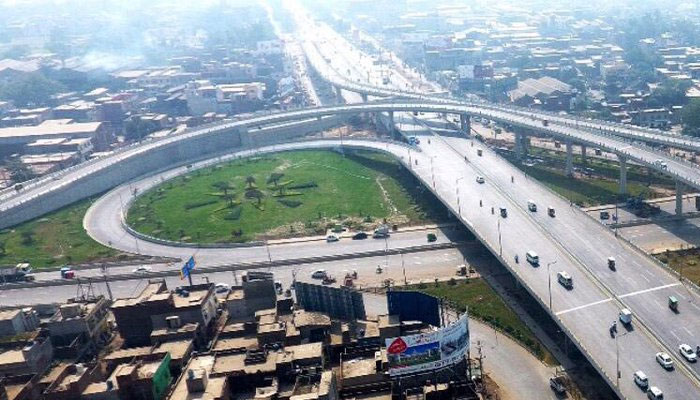‘Infrastructure gaps impeding urban economic contribution’
KARACHI: Pakistani cities lag behind the world in terms of contribution to GDP (Gross Domestic Product), which is currently 50 percent compared to the global ratio of 80 percent, an industry official said on Saturday.
“Lack of investment in infrastructure is keeping our cities behind in economic and commercial growth,” said Nasser Hyatt Maggo, President Federation of Pakistan Chambers of Commerce & Industry (FPCCI).
He was speaking at a meeting, attended by urban planners, builders, and developers and current and former senior management of Association of Builders & Developers of Pakistan (ABAD).
Citing the reasons for the less contribution in GDP compared to global ratio, Magoo said it was due absence of urban planning through a master plan and lack of investment in infrastructure of cities.
“Currently transportation networks are poor, health and educational facilities remain abysmal, provision of utilities like water, sanitation, gas and electricity is insufficient, and industrial areas continue to be underdeveloped.”
Maggo said this negligence persisted during successive regimes and only current provincial and federal governments could not be blamed for it.
Obaid Saleem Patel, Convener of FPCCI’s Central Standing Committee on Urban Development, said United Nations Development Programme (UNDP) had forewarned that due to incessant migration from rural to urban areas, approximately 50 percent of Pakistan’s population would be living in cities.
There will be a mayhem and chaos in Pakistani cities resulting in human tragedy of enormous proportions, if the provincial and federal governments do not wake up now and multiply their budgets for infrastructural development of all the major cities of the country,” Patel added.
Sultan Rehman, FPCCI’s Coordinator for Head Office, said Karachi was the only mega city of the world that was still struggling without a Mass Transit System (MTS) and there was only one bus seat available for 34 people in the city.
According to a World Bank report, urbanisation, which is a common phenomenon in the modern world, has come with new challenges, especially for developing countries.
Such countries, therefore, have to stay ahead in their preparedness efforts to meet these urban issues halfway. Unfortunately, urban residents in Pakistan are living in serious social, physical, and economic hardships.
It says despite being economic engines, cities in Pakistan suffer from stresses like climate change, haphazard and unregulated expansion, housing shortage, and a lack of basic civic amenities.
The World Bank report adds that successive governments in Pakistan gave ample space to urban development in most of the policy documents; however, urban resilience and community engagement were given scant attention.
“This major gap, both in policy and practice, needs to be bridged to promote resilient and sustainable urbanisation in Pakistan,” the report said.
-
 Gwyneth Paltrow Reveals Deep Personal Connection With Kate Hudson
Gwyneth Paltrow Reveals Deep Personal Connection With Kate Hudson -
 Prince Harry, Meghan Markle’s Game Plan For Beatrice, Eugenie: ‘Extra Popcorn For This Disaster’
Prince Harry, Meghan Markle’s Game Plan For Beatrice, Eugenie: ‘Extra Popcorn For This Disaster’ -
 OpenAI To Rollout AI Powered Smart Speakers By 2027
OpenAI To Rollout AI Powered Smart Speakers By 2027 -
 Is Dakota Johnsons Dating Younger Pop Star After Breakup With Coldplay Frontman Chris Martin?
Is Dakota Johnsons Dating Younger Pop Star After Breakup With Coldplay Frontman Chris Martin? -
 Hilary Duff Tears Up Talking About Estranged Sister Haylie Duff
Hilary Duff Tears Up Talking About Estranged Sister Haylie Duff -
 US Supreme Court Strikes Down Trump’s Global Tariffs As 'unlawful'
US Supreme Court Strikes Down Trump’s Global Tariffs As 'unlawful' -
 Kelly Clarkson Explains Decision To Quit 'The Kelly Clarkson Show'
Kelly Clarkson Explains Decision To Quit 'The Kelly Clarkson Show' -
 Inside Hilary Duff's Supportive Marriage With Husband Matthew Koma Amid New Album Release
Inside Hilary Duff's Supportive Marriage With Husband Matthew Koma Amid New Album Release -
 Daniel Radcliffe Admits To Being Self Conscious While Filming 'Harry Potter' In Late Teens
Daniel Radcliffe Admits To Being Self Conscious While Filming 'Harry Potter' In Late Teens -
 Director Beth De Araujo Alludes To Andrew's Arrest During Child Trauma Talk
Director Beth De Araujo Alludes To Andrew's Arrest During Child Trauma Talk -
 Video Of Andrew 'consoling' Eugenie Resurfaces After Release From Police Custody
Video Of Andrew 'consoling' Eugenie Resurfaces After Release From Police Custody -
 'Harry Potter' Alum Daniel Radcliffe Gushes About Unique Work Ethic Of Late Co Star Michael Gambon
'Harry Potter' Alum Daniel Radcliffe Gushes About Unique Work Ethic Of Late Co Star Michael Gambon -
 Japan: PM Takaichi Flags China ‘Coercion,’ Pledges Defence Security Overhaul
Japan: PM Takaichi Flags China ‘Coercion,’ Pledges Defence Security Overhaul -
 Angorie Rice Spills The Beans On Major Details From Season 2 Of ' The Last Thing He Told Me'
Angorie Rice Spills The Beans On Major Details From Season 2 Of ' The Last Thing He Told Me' -
 Teacher Arrested After Confessing To Cocaine Use During Classes
Teacher Arrested After Confessing To Cocaine Use During Classes -
 Questions Raised Over Andrew Mountbatten-Windsor's Line Of Succession
Questions Raised Over Andrew Mountbatten-Windsor's Line Of Succession




